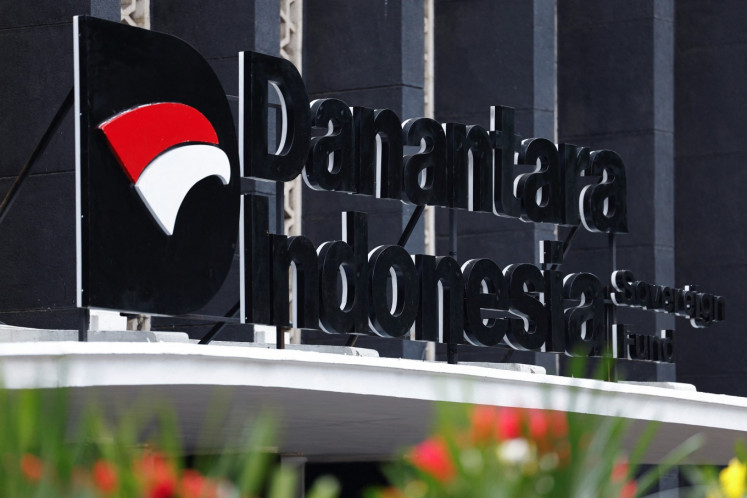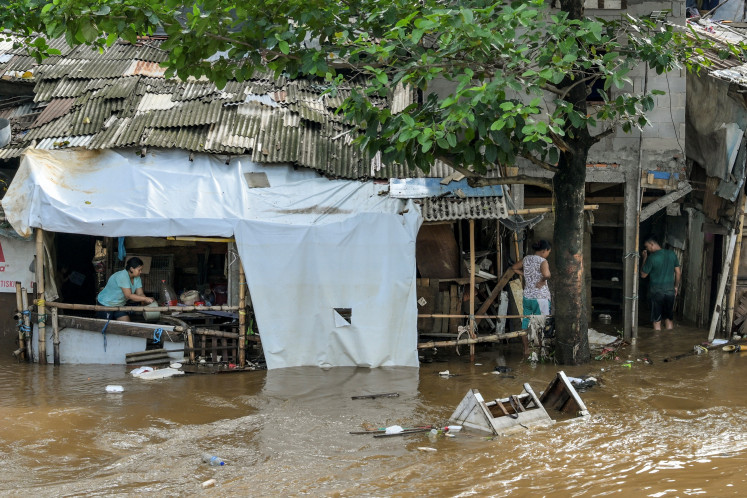Popular Reads
Top Results
Can't find what you're looking for?
View all search resultsPopular Reads
Top Results
Can't find what you're looking for?
View all search resultsIndonesia, the human rights defender in chief
Let’s not forget that if Indonesia is where it is in promoting, defending and championing human rights, it is because of the assiduous and passionate work of many of its human rights defenders.
Change text size
Gift Premium Articles
to Anyone
W
ith all the attention focused on what has been called a fiasco of Indonesian diplomacy in relation to the situation in Myanmar, it would be unfair to just dismiss the attempts made by Jakarta to try to solve the coup impasse there.
First of all, the fact that Foreign Minister Retno LP Marsudi has been engaged in shuttle diplomacy within the ASEAN capitals shows how much Indonesia is invested in the issue of democracy in the region.
Malaysia has been trying to back up a stronger “common” response to the crisis as well, but the delicate political situation there does not always allow the country to invest much in such type of delicate diplomacy.
This makes, in short, Indonesia the most important “defender in chief” of human rights and democratic order in the region.
ASEAN is a diverse regional group united more by shorter terms tactical objectives whose shared values do not exactly include the promotion of human rights and democracy. How could it be otherwise when you have in the group autocracies like Brunei, Cambodia and Vietnam along countries whose democracies are still a work in progress?
Thailand, a case study or a best practice according to the junta in power now in Myanmar, is still grappling with its transition; Malaysia is dealing with an immature political class whose policy-making is still more driven by race considerations rather than the achievement of the common good; Singapore, a trend-setting country in many areas but still a slow learner in matters of democracy and human rights, is totally absorbed by its self-interested outlook of the world.
So, all the burden is on Indonesia and no matter the botched attempt at mediating between the parties in Myanmar, the simple fact that Jakarta is trying to forge a difficult consensus on the issue among ASEAN members is remarkable.
Yet with these diplomatic vicissitudes dominating the global headlines, we are at risk of overlooking other aspects in matters of human rights and democracy that Indonesia should be really proud of.
It is not that the country is perfect, but which country on Earth is in the area of human rights and democracy? Surely not the Western nations, and we know that they are a consistent work in progress with many ups and downs. Even tiny Brunei could undertake a new brighter path, having a better chance at democracy and human rights than Cambodia and Vietnam if its ruler shows some enlightenment and boldness.
What I am talking about in the case of Indonesia is the vast network of civil society organizations promoting and pushing for human rights in the region.
On top of them, as we know, there is the National Commission on Human Rights (Komnas HAM), but then, when we talk about regional human rights, there is the office of the Indonesian commissioner to the ASEAN Intergovernmental Commission on Human Rights (AICHR).
Led by Yuyun Wahyuningrum, who has been active in civil society and is a human rights expert, almost a rarity within the commission, AICHR Indonesia as her office is more widely known, has been punching above its weight recently, pushing a more vigorous human rights agenda internally while being very open in engaging civil society in Indonesia and in the region (where allowed!)
In a couple of online webinars held recently, the Indonesian commissioner explained how the agenda of human rights is being strengthened, though at a very glacial pace. More recognition of the importance of not blocking discussions on human rights within the bloc is emerging and this is itself a success story.
This development was able to happen thanks to a step-by-step approach — probably the only way to effectively pitch human rights within ASEAN.
In summary, “Let’s not expect sudden miracles” was Yuyun’s main message, but it is worth trying — only persistence and determination with the willingness to abide by the internal working procedures of the AICHR and discretion can help move the human rights agenda there.
An inside job, in other words, and this is what Yuyun has been able to do also with the support of her colleague from Malaysia, Eric Paulsen, a human rights defender back home who is also valiantly bringing forward a more progressive human rights agenda in the ASEAN.
Thanks to figures like Yuyun and Paulsen, ASEAN has the best chance to push for a stronger, bolder human rights framework, even if at the end of the day, we need steadfast political leadership — and this is what Indonesia, and hopefully also Malaysia, can do.
Revising the mandate of the AICHR will not only require the right maneuverings by the two most progressive commissioners but also high-level political engagement. This is the front Indonesia must invest in next. It is certainly less glamorous than dealing with coups but nevertheless, where the game is going to be played, behind the scenes, the ASEAN’s way.
Thinking that the issue of human rights can be dodged indefinitely by the leaders of member nations is going to be just delusional, and the President and his foreign ministers are best suited to convey this message.
Meanwhile, Indonesia is showing the way, albeit imperfectly, and this should not be discounted.
Besides Malaysia, Singapore and Thailand (after all, the former generals in charge there need some “escapes” to prove their democratic credentials) must be on board. Such a coalition of willing members can make all the difference, especially when pressing for a bolder and a stronger AICHR.
Lastly, let’s not forget that if Indonesia is where it is in promoting, defending and championing human rights, it is because of the assiduous and passionate work of many of its human rights defenders.
Komnas HAM and AICHR Indonesia are just on the peak of an incredibly active network of advocates and experts who have been incessantly determined to improve human rights at home.
Their hard-won battles, their sacrifices are now helping to turn Indonesia into the best hope for the region in the matter of human rights.
People like Rafendi Djamin and Galuh Wandita, the directors of the Human Rights Working Group (HRWG) and Asia Justice and Rights (AJAR), respectively, just to mention a few and without overlooking their colleagues working at grassroots levels often at their own risk, are what should make Indonesia proud.
***
The writer is cofounder of ENGAGE and writer on social inclusion, youth development, regional integration, the SDGs and human rights in the Asia Pacific.










